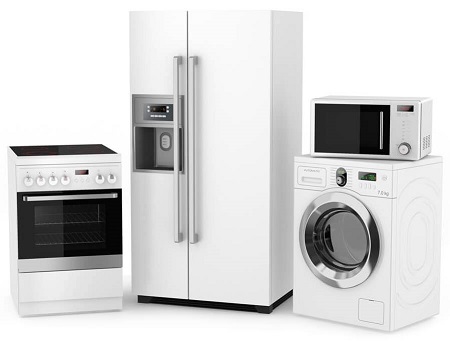
We spend a great deal of money on our major appliances, let’s talk about some steps you can take to keep your appliances running well for years to come.
Refrigerator
Dust It
Dust accumulates around the compressor and coils; this can hamper air flow. Reduced air flow can cause temperature issues and shorten the life of the refrigerator. Once or twice a year clean the compressor and coils. Depending on the refrigerator make and model you might access the compressor from the back or from the front. The user manual will tell you where the compressor is located. If you cannot locate the user manual it can be found on the manufacturer’s website. You can buy special brushes specifically designed for cleaning the compressor and coils, but a vacuum cleaner with attachments also works well. Be sure to unplug the refrigerator before cleaning. It is best to allow air flow around the refrigerator so don’t position it too close to the wall or in an extremely condensed space.
Keep it Clean
Keep the plastic seal around the refrigerator door clean and check for any damage. The plastic seal ensures that the door is closing properly which conserves energy and keeps the temperature inside stable. Wipe the seal down with a damp cloth often and if you spot any signs of damage have the seal replaced.
Choose the Correct Temperature
Most newer refrigerators show the recommended temperature setting on the adjustment knob. You can also refer to the user manual. Using a higher than recommended setting causes the refrigerator motor to work harder than it should. It also drives up your electric bill.
Keep it Level
Be sure the refrigerator is on a level surface. If it is uneven the door may not close properly allowing cold air to escape which makes the motor work harder than it should.
Location
Avoid placing your refrigerator next to a heating outlet or in an extremely hot or cold location. Any temperature extremes will cause the refrigerator to work harder to maintain an ideal temperature.
Oven
Keep it Clean
An accumulation of grime and grease can cause the heating element to work harder. Also check the back of the oven for dust buildup. Use a vacuum with attachments to clean any dust or debris from the back and bottom of the oven.
Appliance experts offer different opinions on the self-cleaning feature. Most agree it should not be used indicating it can shorten the ovens lifespan by heating the oven to extremely high temperatures. This can put stress on the heating elements and internal parts and may even cause damage to the glass oven door. Wipe up spills as they happen and once or twice a year do a thorough cleaning.
Check the Seal
If the oven door seal is dirty or damaged the oven will not heat properly and it may take longer to cook the food. If you notice damage to the seal schedule a service call to have it replaced.
Washing Machine
Don’t Overload
Never overload the washing machine which can strain the motor, belts, transmission and other parts. Clothes should be able to move around freely during the wash cycle. If the washing machine is overloaded it will not clean the clothes properly. Also avoid washing very small loads of laundry which can cause the washer to go off balance and stress the washer’s parts. It is not energy efficient to wash very large or very small loads of laundry.
Clothes Dryer
Clean the Filter
Clean the lint filter after each use. This keeps the dryer from overheating, it also ensures that your clothes will dry faster. A clogged lint filter is also a fire hazard. Clean the lint trap as well. You can buy a special brush that will fit into the lint trap to remove debris.
Also clean the exhaust hose and vent cap. Remove the hose a few times a year and use a vacuum to clean the debris. Inspect the vent cap to ensure it is not clogged with lint.
Don’t Overload
Clothes will not dry properly, and you will need to run it for a longer period of time stressing the hardware. You will also pay more in electricity costs.
Furnace
Schedule yearly maintenance with a qualified professional. They will inspect the furnace for any signs of damage and do a thorough cleaning and tune-up. They should also check for carbon monoxide leaks. Schedule a service call in the late summer or early fall to be sure your furnace is ready for the winter months.
Replace the Filter
When the filter becomes clogged with dust the furnace must work harder to heat your home stressing the system and driving up your electric and gas bill. Change the filter several times during the heating season. Also be sure you are using the correct filter for your furnace. An ill-fitting filter will not work properly. Filters often go on sale during the summer so stock up then.
Update the Thermostat
If you live in an older home, you may want to consider replacing the thermostat which can improve over-all efficiency and offer updated features.
Clean the Area Around the Furnace
If there is a lot of dust or debris near the furnace it can get into the furnace causing damage. Keep the area around the furnace clean. And never place anything flammable or combustible near the furnace.
And a final thought. When purchasing a new appliance consider the scratch and dent section of your local appliance store. Minor scratches, dents and other flaws do not affect the life cycle or performance of the appliance and you receive the same manufacturer’s warranty as you would with a new unit. This can save you hundreds of dollars.